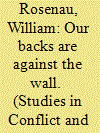|
|
|
Sort Order |
|
|
|
Items / Page
|
|
|
|
|
|
|
| Srl | Item |
| 1 |
ID:
120435


|
|
|
|
|
| Publication |
2013.
|
| Summary/Abstract |
This article addresses the gap in the literature on U.S. domestic terrorism and counterterrorism in the 1970s by examining a once-notorious but now largely forgotten terrorist group, the Black Liberation Army (BLA). An outgrowth of the Black Panther Party, the BLA was directly responsible for at least 20 fatalities, making it amongst the most lethal "homegrown" U.S. groups of the period. This article seeks to shed new light on the BLA by exploring its relatively short but violent trajectory. By focusing on the group's origins, operations, ideology, and structure, the BLA can be understood as part of a wider landscape of homegrown political violence. The BLA emerged during the waning phase of a protest cycle that included the civil rights, Black Power, and anti-war movements. Like other terrorist groups before and after, the BLA claimed to be acting in self-defense and on behalf of the people, presenting itself as an army resisting police occupation of minority communities. With the collapse of the extreme Left in the mid-1970s, the BLA's prospects for creating a broader revolutionary base became remote. The article also examines law-enforcement responses to the BLA and the competing ways in which the Federal Bureau of Investigation and local police (and in particular, the New York Police Department) framed and countered the BLA threat.
|
|
|
|
|
|
|
|
|
|
|
|
|
|
|
|
| 2 |
ID:
182655


|
|
|
|
|
| Summary/Abstract |
The past ten years have witnessed a revival in scholarship on militarism, through which scholars have used the concept to make sense of the embeddedness of warlike relations in contemporary liberal societies and to account for how the social, political and economic contours of those same societies are implicated in the legitimation and organization of political violence. However, a persistent shortcoming has been the secondary role of race and coloniality in these accounts. This article demonstrates how we might position racism and colonialism as integral to the functioning of contemporary militarism. Centring the thought and praxis of the US Black Panther Party, we argue that the particular analysis developed by Black Panther Party members, alongside their often-tense participation in the anti–Vietnam War movement, offers a strong reading of the racialized and colonial politics of militarism. In particular, we show how their analysis of the ghetto as a colonial space, their understanding of the police as an illegitimate army of occupation and, most importantly, Huey Newton’s concept of intercommunalism prefigure an understanding of militarism premised on the interconnections between racial capitalism, violent practices of un/bordering and the dissolving boundaries between war and police action.
|
|
|
|
|
|
|
|
|
|
|
|
|
|
|
|
| 3 |
ID:
038681


|
|
|
|
|
| Publication |
London, Hutchinson, 1970.
|
| Description |
xi, 429p.Hbk
|
| Standard Number |
0091057507
|
|
|
|
|
|
|
|
|
|
|
|
Copies: C:1/I:0,R:0,Q:0
Circulation
| Accession# | Call# | Current Location | Status | Policy | Location |
| 006080 | 923.373/SEA 006080 | Main | On Shelf | General | |
|
|
|
|
|
|
|
|
|